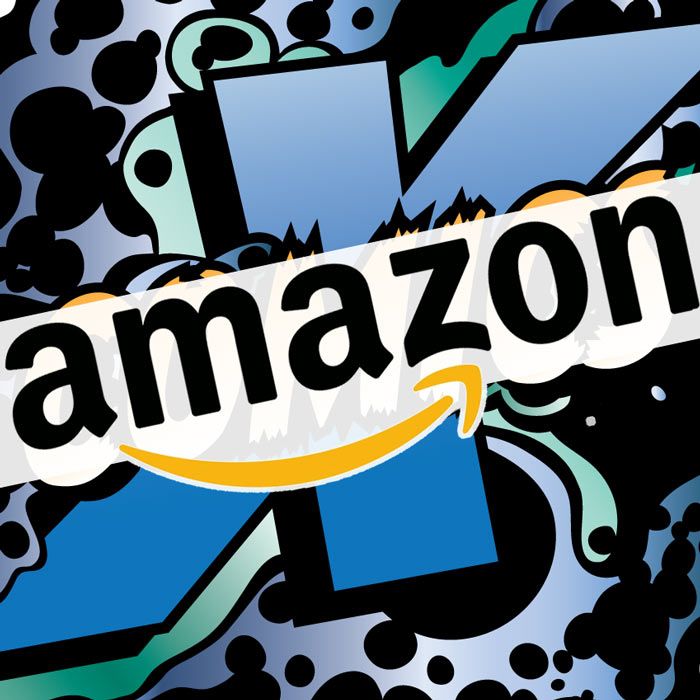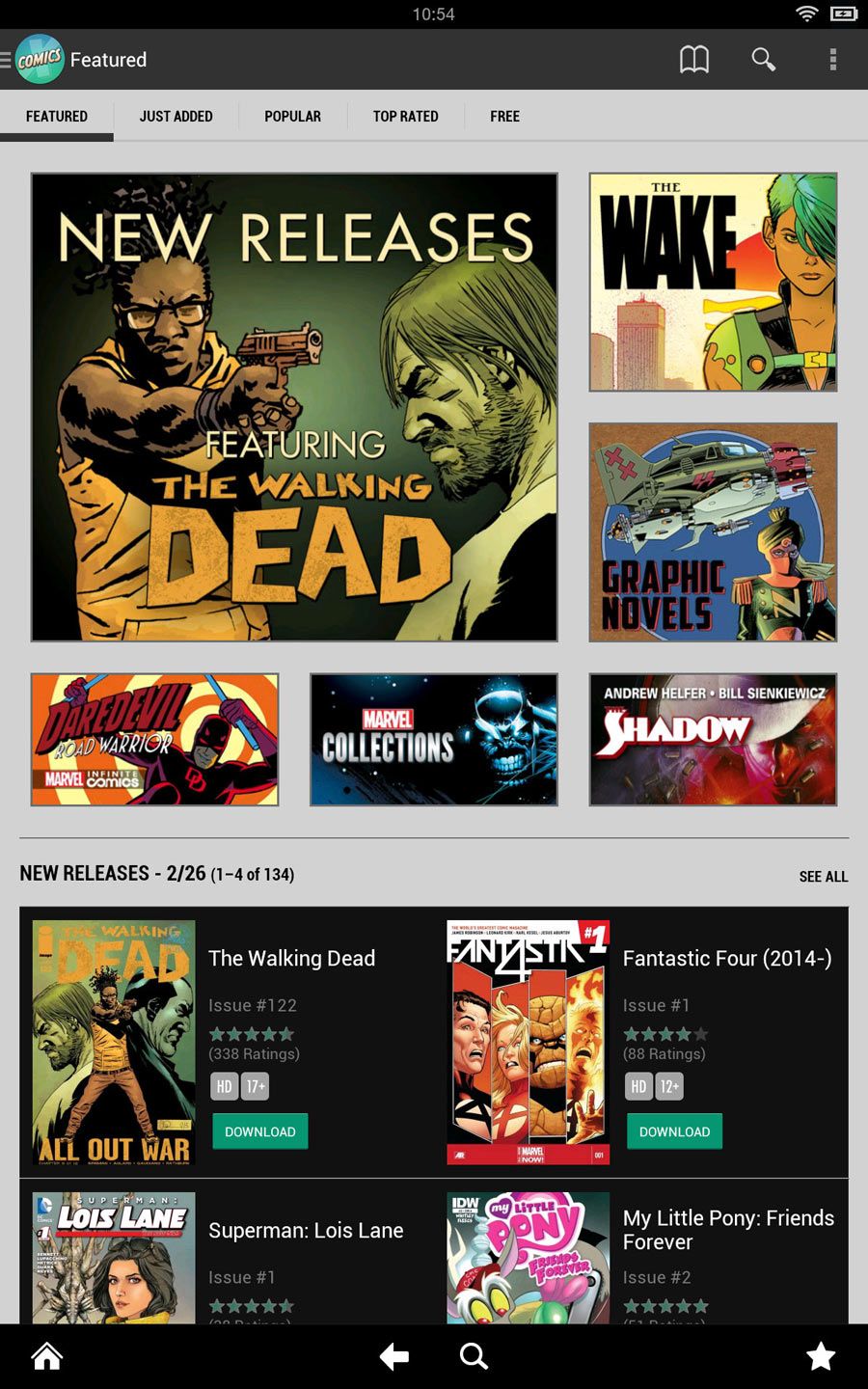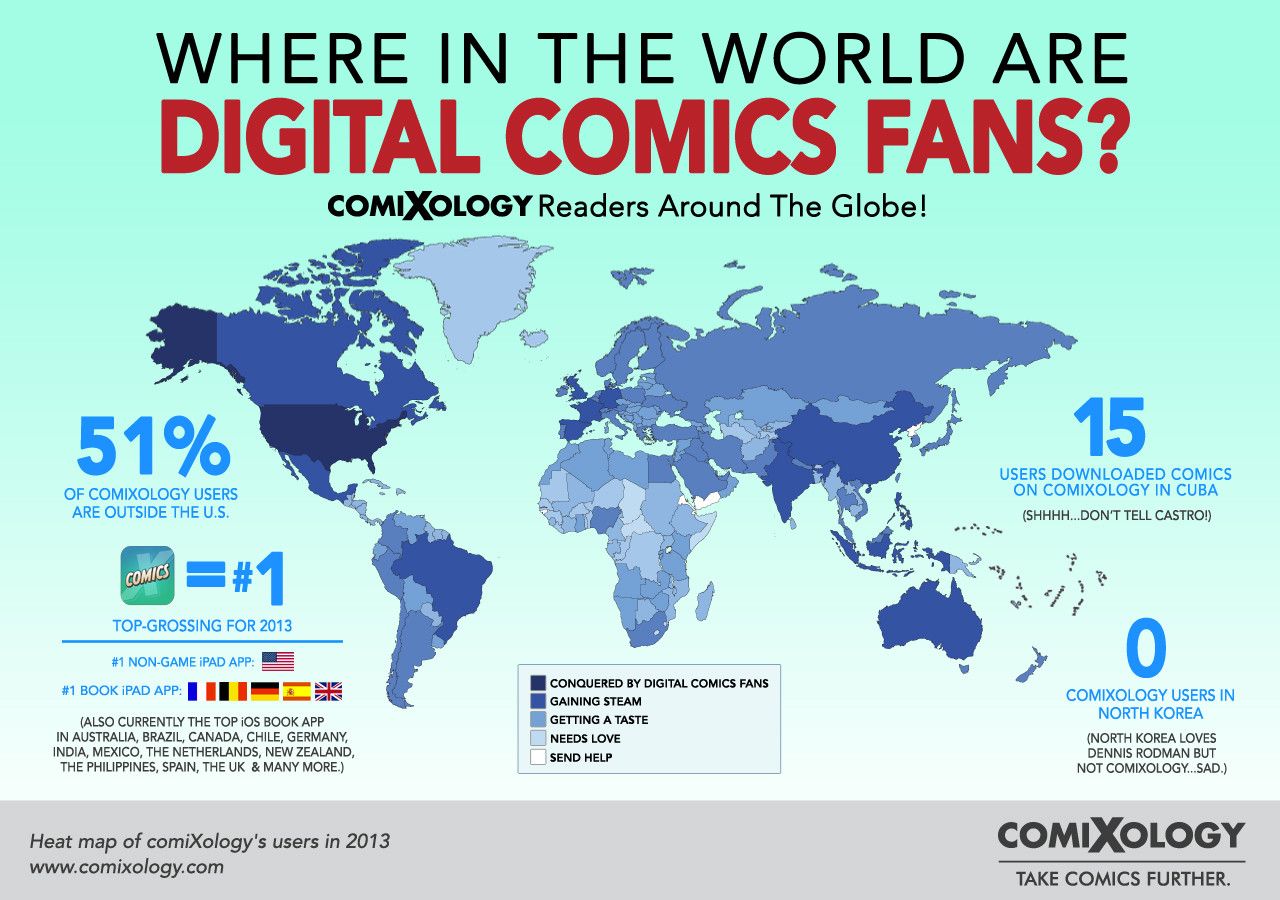Thursday's announcement that Amazon.com, the world's largest online retailer, had reached an agreement to purchase comiXology, the leading digital distributor in the North American comic book market, was certainly big news, but it immediately raised some even bigger questions: Why Amazon? Why now? What's next? Will the user experience be affected? And, a popular one, "will drones now deliver my digital comics?"
CBR News spoke with comiXology co-founder and CEO David Steinberger and Amazon vice president of content acquisition and independent publishing David Naggar to discuss the news. At this point, the bottom line from both parties is that it's still early in the acquisition process, and the type of integration that might be possible as the brands merge is still being figured out. In short, for now, things are planned to run the same as they have been.
Despite this being early days, however, Steinberger and Naggar were open with their hope that Amazon's massive user base will expand comiXology's potential audience -- and in the process, the comic book market as a whole. And while both Steinberger and Naggar declined to comment on how long the deal has been in development and the undisclosed price of the acquisition, our conversation proved to be an informative one.
CBR News: David, David, let's start with the obvious -- why is this the right deal, and why is now the right time?
David Steinberger: We've been at it seven years so far. We launched digital about five years ago. We obviously had a really terrific run. What's really great about connecting with Amazon, and why we chose this to be the right time, is that they really get comics. They really get comiXology. We got a year or more ahead of them in our experience around comics, since it wasn't their first focus, but at the same time, they have such an enormous ability in so many different areas, whether that's just sheer audience for Kindle -- I'm salivating at the idea that we can give the Kindle users an amazing comic book experience -- to personalization and all the really amazing things they do. Frankly, what's really interesting as a company like comiXology, as I said to my developers a few times, we have to build most of what Amazon is doing just for comics if we want to do this really, really well.
The fact is, this is an amazing opportunity for us to connect more comics to more people, and that's our personal desire. Just to put it simply, we're staying on with the company, we're a wholly owned subsidiary -- all of these things are very important to me, because it means that Amazon gets our vision. They like our vision, they see that we've succeeded so far, and they feel like they can help us succeed some more. And that's just really huge for me.
David Naggar: We've watched with admiration from afar for several years what comiXology has built, particularly in terms of the customer experience, but also in terms of the audience that they developed, and saw that they brought people to the comics space that didn't even know they wanted or would enjoy reading a comic. And that's huge. The customer focus of the company was so obvious, and it is something that is really important to Amazon, to associate itself with companies like that. It felt like a very natural association, and we're super-thrilled.
It's early still, but for both of sides, what are you hoping to see from this deal? David S., how do you envision comiXology growing in ways that might not have been possible otherwise?
Steinberger: What's interesting about Amazons' approach, and one of the things that attracted me to it, is that when you have a functioning company that's doing well, Amazon first just gets to know the company, puts the resources behind the company, we finish this transaction, and then we talk about what's next. Then, we start brainstorming what we can do together. At that point, we really start digging in. In the meantime, we just do our business. As a wholly owned subsidiary, we get to continue our relationships the way they are, we get to keep moving in the direction we've been moving in, and we get to explore the possibilities forthcoming. That's a very long-winded way to say we actually have not, believe it or not, made huge plans, on new features and new combinations that any one of us can think up a million really great things to do. We've got to think of those, and pick them out, and get it done.
Naggar: Couldn't have said it better.
In just the few hours this has been out there, people have been speculating about what could be possible, and different possibilities for integration between the two entities -- is there anything that's exciting either of you about what's now possible?
Naggar: It's funny, because I'm reading through the same things you are, going, "Oh, hey that's an interesting idea. That's a pretty cool idea." David was not being disingenuous -- we really haven't spent a lot of time thinking about what are the detailed things we can do together moving forward. We'll update you when we have concrete plans, but when you're buying a leader in its space like comiXology, you don't have to go through that detailed thinking before. So we're just looking forward to figuring out all the ways we can help each other down the line.
"Wholly owned subsidiary," has been said a couple of times, and David Steinberger's letter on comiXology's site said the company will retain its identity -- is the expectation that comiXology will continue to operate as it has, while also taking advantage of new opportunities? Is that the plan going forward?
Naggar: That's the plan. And the other way, too. Kindle will continue to operate its comics business with its relationships with comic publishers, but clearly over time, the comiXology user experience is so good we want to make sure that we're benefitting from their experience.
An obvious question is how this might affect the user, and it sounds like at least for now, the word is that it won't. Is that correct?
Naggar: Right.
Steinberger: Absolutely.
Amazon is the leader in online retail, and comiXology has been able to reach out to non-traditional comic book readers by being a digital publisher and breaking down some of those walls -- but for you, David S., how much potential do you see there in reaching an even wider audience?
Steinberger: Oh, man. It's funny -- we started saying this thing internally in the company a long time ago, and it's actually part of our little tagline: Our goal is to bring comics to everyone everywhere. The idea that we can find a reader and then get to know them, and match them to content they might like, and at the same time, expand the market -- which means more content is going to be made, that there's more diverse available for different kinds of readers, which means we get to reach more readers -- Amazon's really good at that. We've done a great job, but Amazon is the expert at matching potential readers to books that they're interested in. Their attitude is, "Read Kindle books everywhere." That's our attitude as well, in terms of different devices, available on all platforms.
You can probably hear -- I'm actually tongue-tied over the potential to expand this market, and how exciting that is, and how passionately we love, and our company loves and every employee loves, this market. You could see it in their faces when we talked to them earlier today -- they love the idea that we're going to be able to continue this good work in an even bigger way. If you look at the last few years -- we put together this business plan seven years ago. We said, "Comics have already been disrupted in print. We're not going to destroy comics. We think we could even help print comics." And, through our help and, I think, through great media help, in terms of the popularity of comic book properties -- the print market's grown in the last two years. Our audience, as they come in, as you might know from the stats we sent out late last year, is getting younger. The new buyers are younger, the new buyers are more female, we have more buyers that are buying comics for the first time in digital, and then turning around and buying print within just a couple of months. I'm very excited on all fronts for what this means for the comic book industry, and hopefully this means more great content -- more diverse content, and more readers.
David N., David S. mentioned comics being important to Amazon, but from your own perspective, how committed is Amazon to the comics world, and how important is this acquisition in that context?
Naggar: We worked really, really hard over the last two or three years to deliver a good comic book experience, digitally. To find deals with all the right publishers, to make the publishers happy, the content creators happy -- and we're very proud of that store and that experience. But again, when you get a chance to associate yourself with such a leader, you jump at it. We are very, very excited about the comics space in general. There's a huge potential for us and others in that space, and the way those stories get told in the US and around the world, there's a lot of room for us and others to get in there, and give customers a really, really great experience.
Obviously comiXology has had success with its apps on Apple's iOS devices. With Amazon being a competitor in the tablet market, do either of you foresee this deal complicating things on that front at all?
Naggar: I don't. Amazon, yes, is a competitor in the tablet market, but also has cross-platform apps on every platform, from iOS to Android to Windows. The philosophy at Amazon when it comes to digital content, particularly books, is, we want you to be able to consume that content wherever you want to do it. So if you choose never to buy one of our devices, you will still always have access to your Kindle library, and you'll be able to read it on just about every platform. That philosophy already exists within Kindle, and I wouldn't expect that to change, at all.
David S., do you share that same confidence?
Steinberger: Absolutely. Wouldn't do it otherwise.
Just to make it clear, in terms of comiXology existing as its own entity despite this acquisition, does that include staff and offices -- there's no consolidation planned?
Steinberger: No, none at all. We're in New York City. Every employee gets a job offer. It's the right way to do it. You can probably tell I'm grinning my ass off -- it's a really great thing for us to be able to do, and feels like the right way to do it.
So, it's still the same team in place.
Steinberger: Absolutely. 100 percent.
Naggar: We'll be adding some staff to focus on the work that needs to be done on the back-end to bring comiXology into Amazon, technically speaking, but otherwise we love this comiXology team.




